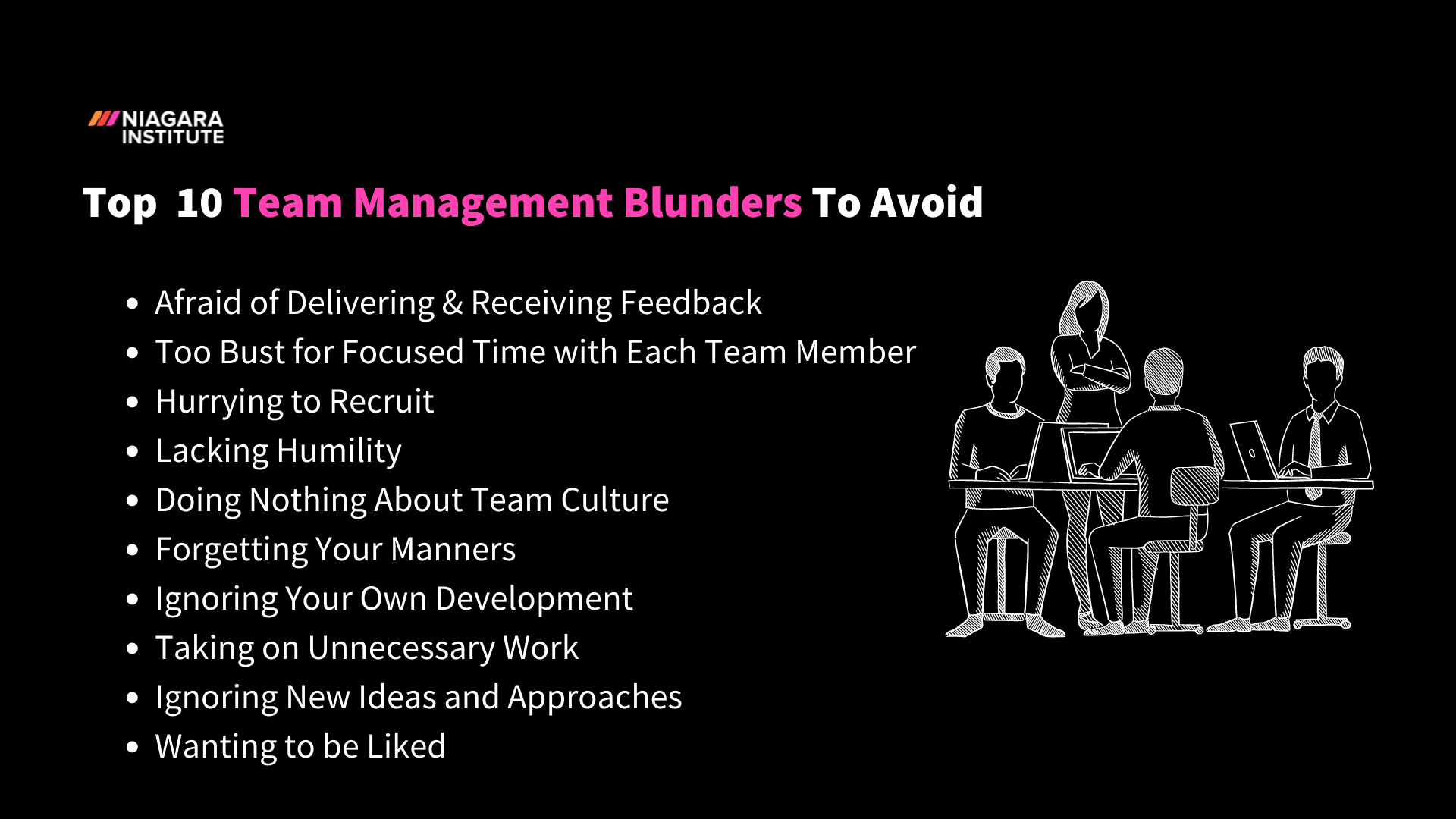5 min read
Why It’s Time to Prioritize Team Dynamics
If the events of the last year have taught us anything, it’s that teamwork matters more than ever. If a team cannot be high-performing in the best of...

Everyone new to leading a team, whether you're a first-time manager, supervisor, or project lead, will experience a learning curve. Going from someone on the team to leading a team is a difficult transition and inevitably mistakes will be made. And while no one likes to make mistakes, team management pitfalls can be minimized or altogether avoided if you know what to look out for. With that in mind, here are 10 common team management blunders to watch out for.

Feedback can help us grow, develop, and become aware of things we do not see in ourselves. Yet, the idea of receiving feedback strikes fear in many as it draws on negative perceptions we have of ourselves, and it will expose that we’re not good enough. For this reason, many in team leadership positions avoid performance management and giving feedback as they hate receiving it themselves.
This is a disservice to you and the team you lead. Delivering constructive feedback in a way where it is a positive experience can help each individual on the team grow and excel in their role. A significant part of team management is developing those around you to be the best possible version of themselves. This goes for you as well. If you’re afraid of receiving feedback, how will you grow as a leader?
In a survey of employees, 52% of respondents said that “not having time to meet with employees” was an issue they had with their boss. However, to be successful at team management, you need dedicated time for each team member to bring out the best in each individual. The easiest way to ensure this happens is to schedule one-on-one meetings with each team member. This ensures you have the time in your calendar to provide coaching, and constructive feedback, build trust and talk about their career trajectory.
A blunder those in team management can make when everyone is overwhelmed and burnt out from the volume of work is to hire a new team member quickly. Although this may seem like it will solve the urgent problem at hand, hurrying recruitment may cause more problems than you started with.
The old saying goes, “one bad apple spoils the bunch.” This is very true for team dynamics and performance. In fact, one study of financial advisors found that a current employee is 37% more likely to commit misconduct if they encounter a new co-worker with a history of misconduct. The outcome doesn’t have to be as serious as misconduct. Still, a bad attitude, lack of accountability, undermining other team members, or abrasive communication can bring a once-thriving team down. Take your time hiring for aptitude, character, and fit to avoid these pitfalls.
A mistake learned the hard way by many first-time managers is the assumption they must be the smartest person in the room, and if they do not appear as so, people will begin to question why they’re even in a leadership position. Instead, as a team manager, you should show humility by admitting that you do not have all the answers, taking responsibility for your actions or part of the problem, and giving credit where credit is due. Individuals appreciate a team leader who demonstrates humility. In fact, one survey found that when a leader showed humility, it led to higher-performing teams, increased teamwork, and flexibility in creating strategies.
An organically grown team culture, where each team member forms the team norms on how to interact and behave, can be a disaster. For a team culture to thrive, it requires intentionality from the team leader to determine the team values, vision, and associated behaviors needed to make them successful.
The team culture should be more than a PowerPoint slide of the behaviors you want to see. It needs to be part of the team's fabric, and how they work together to get the job done. Team management requires deliberate and ongoing focus and reinforcement to bring it to life. The hard work of forming a desired team culture is worth it, as was found by a Deloitte study where 88% of employees felt a strong, positive culture is key to business success.
As we were taught as kids, it’s important to say thank you. This goes for the workplace as well. Showing genuine gratitude by thanking your team costs nothing and shows you value and appreciate the effort they put forth. It was found that 70% of employees said that their motivation and morale would improve if their boss simply said thank you more often.
It’s hard when you’re in a team management role with so many forces vying for your time to step away from work to invest in yourself by attending a leadership development training program to gain knowledge and essential leadership skills. Yet, it is so crucial. By design, a leadership development program equips you with the tools to develop others, have coaching conversations, manage team dynamics, be a change leader, and accelerate team performance. Without it, you’ll be doing your best by trial and error.
When you’re responsible for your team's results and your capacity is limited, it is easy to fall into the narrative of “it’s easier if I just do it.” However, overloading yourself with tasks that your team could complete undermines them, breaks trust, and leaves those around you unmotivated as these actions appear, you do not have faith in their abilities to complete the work you’ve hired them to do. Successful team management requires delegation of work and providing those you delegate with the context, guidance, and autonomy to complete it how they see fit. In doing so, your team feels valued and empowered, and you are freed up to focus on higher-value activities that only you can do.
The average employee shares six ideas per year, but only 43% are even acknowledged. Over time, when managers and supervisors stop listening to new ideas and approaches, employees become discouraged and unwilling to speak up when something could be done differently, reducing engagement, job satisfaction, and communication on a team.
It’s human nature to want to be liked. However, to be successful at team management requires making unpopular decisions from time to time. In an article by Mark Sutter, a silicon valley venture capitalist, he examined entrepreneurs at tech startups and the quality of their leaders. He said, “One thing that I’ve realized over the years is that to be an effective leader, you can’t aspire to be loved by everybody. I think people with this affliction have a hard time being great leaders. They dither on decision-making. They fudge on org charts to appease people. Clarity of purpose in leadership matters.”
When your goal is to be liked, your decision-making becomes skewed by your emotions, personal feelings towards those you lead, and trying to reach a consensus with everyone’s input. Team management isn’t easy, and you will have to become comfortable with making tough decisions and sticking with them.

5 min read
If the events of the last year have taught us anything, it’s that teamwork matters more than ever. If a team cannot be high-performing in the best of...

9 min read
Have you ever worked in a team where you can’t keep it together because there’s no order? Where team dynamics and leadership are lacking, and there’s...

11 min read
The fact is that managers who receive little to no leadership training and lack the skills they need to lead effectively are costly. Gallup estimates...